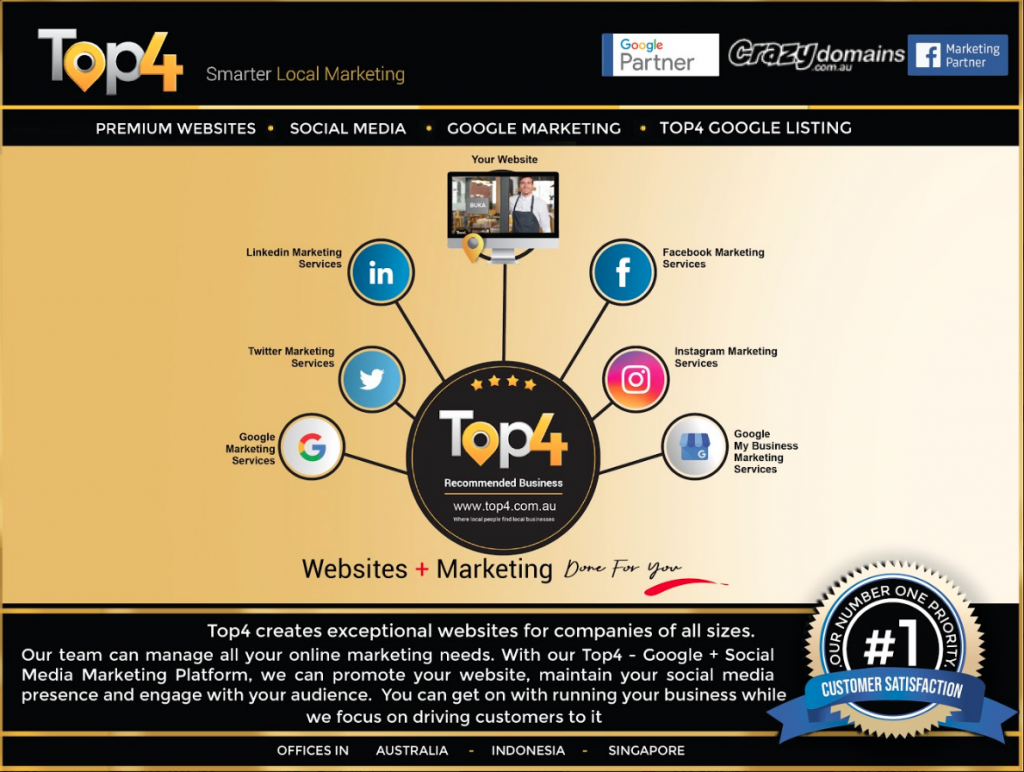As Google gets better at interpreting language and search intent, can we finally take it easy on keywords?
Not really. Keywords remain important indicators of how people use search. Even though we no longer need to go after the exact keywords, an analysis of keywords offers ideas for content that’s relevant to searchers and shows gaps that your content could fill.
To that end, these seven free keyword research tools, from most comprehensive to a little extravagant, can help.
1. Keyword Surfer
If you want a fully immersive keyword research experience, then consider adding the Keyword Surfer Chrome extension. It hijacks each of your Google searches by displaying keyword statistics in the search bar. It also adds a side panel to the search result page, providing the top 10 keywords similar to the current query.
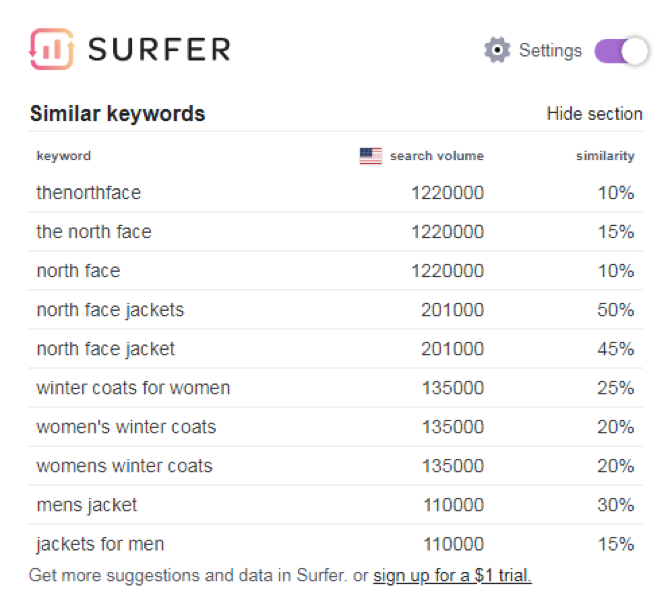
Now, Keyword Surfer is not intended to be your primary keyword research tool – the data is far from complete. But, it’s still a handy tool to have running in the background in case something catches your eye during your daily browsing.
Best for: Tip-of-the-iceberg ideas that can appear without adding another step
2. Google Keyword Planner
Keyword Planner is a perfect balance of sophistication and simplicity. On the one hand, it’s a Google SEO tool so it accesses one of the biggest and the most reliable keyword databases. On the other hand, it doesn’t allow for much research customization and discloses only the most basic of keyword quality metrics.
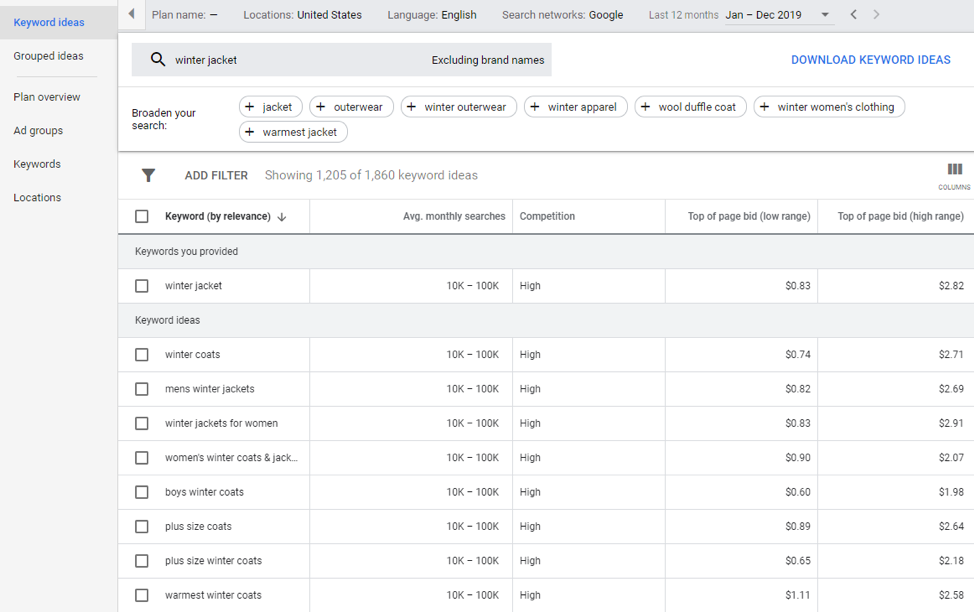
Enter a few seed keywords and get a list of semantically similar keyword suggestions, complete with metrics like monthly search volume, competition, and bid ranges. There are likely to be thousands of results. You can use the sorting and filtering options to narrow them down. Most notably, you can exclude negative keywords – you won’t see the results for searches that include those words.
Even though you can see a lot of keywords, the variation is narrow and unlikely to inspire original content ideas. That said, Keyword Planner is still a great place to start your keyword research. Once you weed out irrelevant results, synonyms, and seldom-searched terms, you are left with a keyword list of about a dozen basic but actionable terms.
Best for: Finding pillar content ideas
3. QuestionDB
Another question-oriented keyword finder, QuestionDB pulls a keyword list from a database of over 48 million questions asked on Reddit.
When people post to Reddit, they ask questions that are not readily answered by Google. That’s your opening to create a unique piece of expert content. You can even add it to the topic’s Reddit thread once it’s ready.

Sometimes this tool returns nothing useful, but other times it can be fascinating. In a search for “winter jacket,” I was surprised to find a question about using a rain shell and a sweater to construct a winter jacket and more than one question about form-fitting down jackets. Right there are two unexpected but promising content ideas.
Best for: Finding ideas for niche expert articles
4. Rank Tracker
Unlike most other SEO tools on this list, Rank Tracker is a collection of nine research methods. Those approaches can be broadly sorted into two distinct categories – spying on your competitors and playing with keyword semantics.
![]()
Rank Tracker finds the highest-ranking keywords for a competitor and exposes the keyword gaps on your site. As for semantic research, enter a keyword and get a list of related searches, related questions, and autocomplete suggestions. Keywords collected this way are a gold mine for content makers because many of them already sound like article titles.
In addition, Rank Tracker integrates with Google’s SEO tools, including analytics, keyword planner, and search console, so you can see detailed quality metrics, like organic search volume and keyword difficulty.
Best for: Borrowing good content ideas from your competitors
5. Google Trends
Using Google Trends is not as much about discovering the best keywords as it is about prioritizing your content ideas. It shows keyword popularity over time and across geographic locations. You can plot and compare several keywords on the same graph.
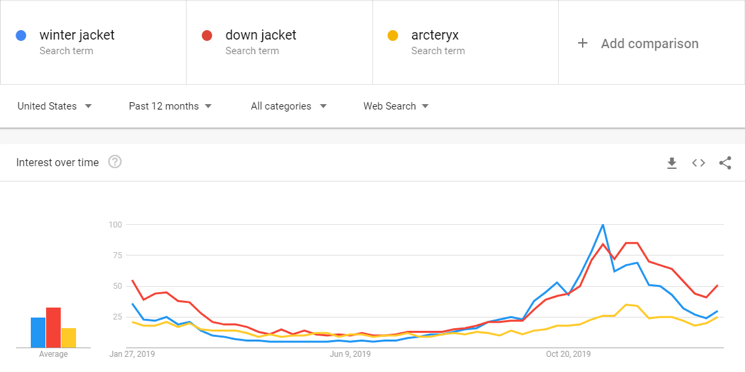
For example, Google Trends reveals “winter jacket” and “down jacket” are not as interchangeable as they seem. Searches for “winter jacket” peak in early November and are quickly overtaken by searches for “down jackets.” Perhaps people searching for winter jackets end up learning about the types and conclude down is the best type so they search for “down jacket.” After they learn about different down jacket brands, an uptick in “Arcteryx” searches can be seen.
With this information, a series of articles based on keyword priorities during the calendar year should be created and scheduled. Using this example, you could create a guide on types of winter jackets followed by a listicle of the best down jackets, and then publish a detailed review of best Arc’teryx models.
Best for: Refining your content strategy and editorial calendar based on keyword trends
6. Google Search Console
Google Search Console lets you discover opportunities for those keywords already used on your website.
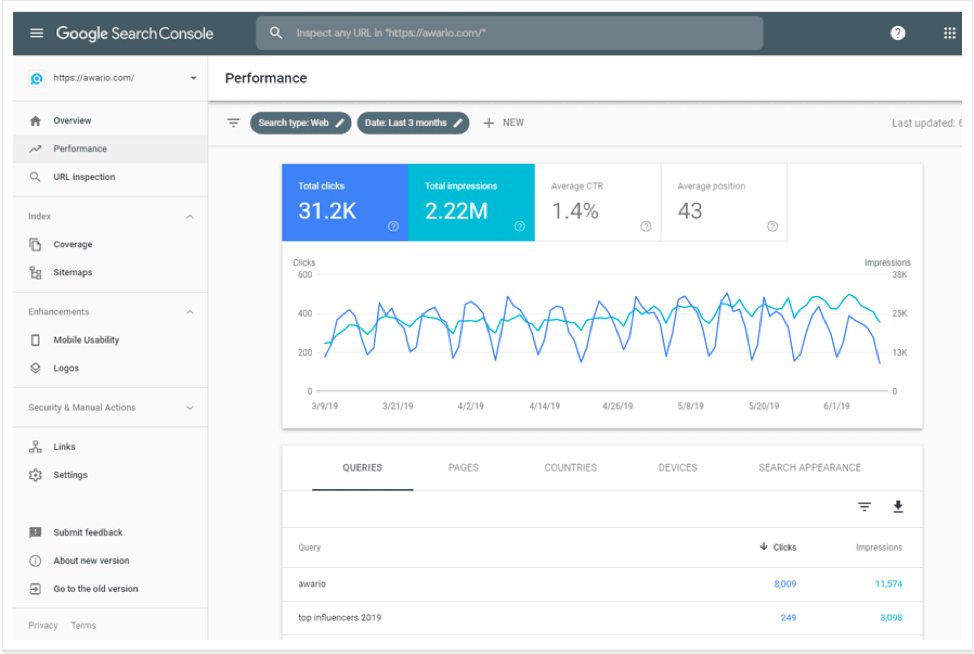
Google Search Сonsole provides a list of keywords that your site ranks for, including SERP positions and click-through rates. The trick is that each SERP position has a widely accepted CTR benchmark. For example, a keyword in the first position should expect to have a CTR of about 30%. Each consecutive position drops an average of 5%, and the last four positions on the first page of SERP get a CTR of about 3%.
You can see if a keyword is falling behind its SERP position CTR benchmark. To raise the CTR, you could work on your snippets – come up with a catchier title, optimize the meta description, apply schema markup, or even rewrite the page to make your content a better fit for users’ expectations. Making improvements is likely to bring more traffic than trying to rank with new keywords.
Best for: Identifying underperforming pieces of content on your website that could benefit from a fresh coat of paint
7. Answer The Public
Searchers are increasingly confident in using natural language when forming queries because search engines are getting smarter and delivering the results searchers seek. More highly specific, question-like searches are being asked and Google is delivering more featured Q&A snippets at the top of results.
If you want to join this game, Answer The Public is a perfect place to start your search for long-tail keywords.

Enter a keyword and Answer The Public turns it into an appealing infographic of the relevant queries that use questions, comparisons, and prepositions sorted by popularity.
That’s all the tool does, but the displayed queries are always on point and present a few dozen actionable ideas for each keyword. Some of those queries could be turned into stand-alone articles, while others may be grouped as section headers in a larger piece of content.
Answer The Public is a direct line to members of your audience, their concerns, and the language they use to express them. All you have to do is publish the answers they seek.
Best for: Generating ideas for individual articles or detailed guides
Connecting searches to content
These seven free SEO tools range from an easy tool for the lazy keyword search to a niche tool for Reddit question search terms. Start with comprehensive SEO tools that return basic results and move on to wild-card tools to find something edgy. Let me know what SEO tools you use and how they inform your content development.
Looking to build customer loyalty through social media? Don’t forget to add your business to Top4.com.au
List your business, create your own digital store to sell goods and services, and share posts on social media. Promote your business on Google instantly! Should you need help with local digital marketing then view our new Google Marketing Platform and services Top4 Marketing
Get Found On Google Promote Your Website, Reach local customers today!
Our Digital Marketing Agency Services Across All Industries Include Search Engine Optimisation (SEO), Google Marketing, Website Design, Corporate Web Development, and local location-based marketing using our own Google Marketing Platform!
Engage A Social Media Agency For Only 1/3 The Cost Of Employing A Social Media Manager…LET’S TALK!
Source: cmi

